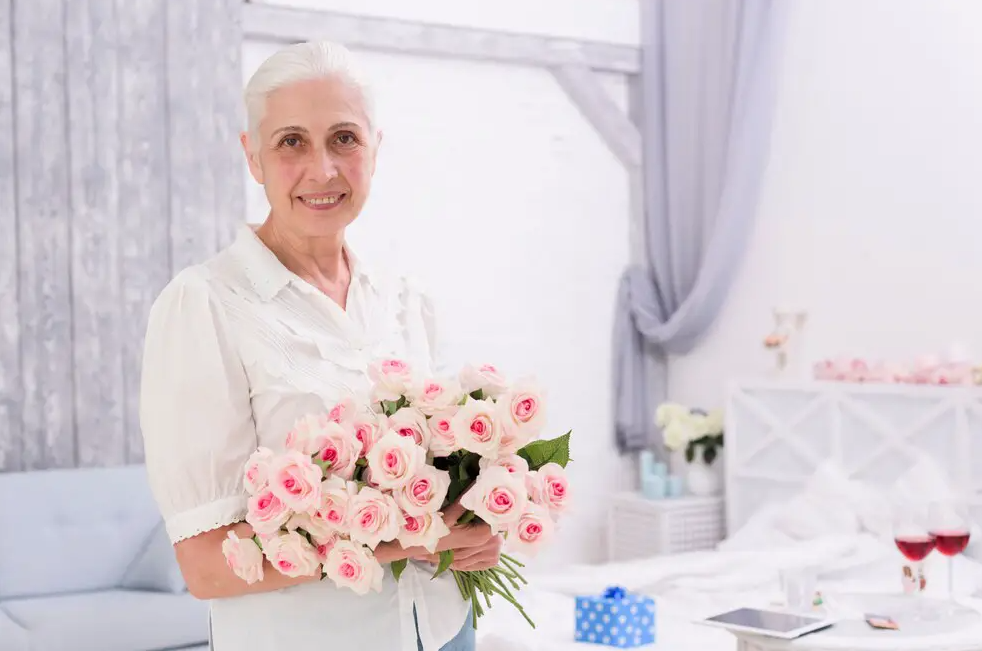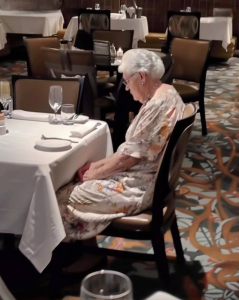At Her Picture‐Perfect Wedding, My Aunt Humiliated My Grandmother for Her Gift—So I Taught Her a Lesson She’ll Never Forget
Chapter 1: A Celebration Planned with Love
For generations, my family has upheld traditions that were woven into the fabric of who we are. On a crisp spring morning, as vivid blossoms heralded the arrival of a new season, arrangements were finalized for what was meant to be a day of heartfelt celebration. My grandmother, an embodiment of quiet dignity and resilience, was to be honored on her 85th birthday at a family wedding—a special day meant not only to commemorate her life’s achievements but also to bring together a family whose bonds had been built on selflessness and love.
At her picture-perfect wedding, every detail had been meticulously planned. Invitations sent with warm handwritten notes, the gentle clink of china during dinner, and even the floral arrangements were chosen with care to evoke the beauty of generations past. For my grandmother, the day meant a return to the values that defined her entire life: the simple, honest joys of a handcrafted bouquet, a lovingly preserved heirloom, and the reassuring feel of time-worn family artifacts—reminders that true beauty was found not in overt extravagance but in heartfelt sincerity.
I had long admired my grandmother for her ability to find delight in life’s smaller treasures: the pies cooling on a windowsill, the Halloween costumes she had painstakingly sewn when store-bought items were beyond reach, and the handwritten thank-you notes she sent for every gift, each penned in perfect cursive. “A thank-you note tells someone they matter,” she would gently say, her voice imbued with wisdom and grace. I remember with fondness how she would smile as she allowed me to lick the stamp on each envelope—a tender, humorous ritual that established a quiet bond between us.
Despite the humble origins of our cherished traditions, that wedding day took a turn I could never have foreseen. At the center of the unfolding drama was my Aunt Caroline—Grandma’s youngest daughter and my mother’s sister—a woman whose very presence was as polished and exacting as a modern work of art. Caroline had always been known for her unwavering pursuit of perfection. Every detail of her life was meticulously curated to be Instagram-worthy: her opulent home, her impeccable wardrobe, and even her choice in partners, as her husband-to-be was a successful finance professional. For Caroline, life was a stage, and every moment had to be a dazzling performance, crafted to showcase not only her success but also her impeccable taste.
In the weeks leading up to her wedding, my aunt had transformed what was originally intended as a modest gathering into an extravagant celebration—a black-tie affair set against the refined backdrop of an exclusive vineyard. Elegant drones hovered in the background, capturing every sweeping panorama, while invited guests arrived in designer ensembles, their laughter mingling with the delicate notes of a live quartet. It was a scene befitting an event meant to capture public attention; however, in the midst of all the grandeur, a quiet act of devotion was about to become the center of a dramatic confrontation.
For three unassuming weeks before the wedding, I had noticed my grandmother spending her spare moments working on a special gift. With painstaking care and gentle precision, she had taken a small section of lace from her own wedding dress—a cherished relic of a bygone era—and set it aside like a secret treasure. From a velvet box tucked away in a forgotten dresser drawer, she withdrew a delicate silver ring, its surface etched with tiny, intricate floral patterns. Though it was modest in appearance, the ring carried a heavy legacy. My grandmother confided in me that the ring had been passed down from her own grandmother, a symbol of enduring love that had weathered hardships and celebrated quiet victories. “I wore it the day I married your grandfather,” she would whisper, her voice soft and laden with memory. “He was so handsome on that day—not rich, mind you, but kind. Always kind.”
When the morning of Aunt Caroline’s wedding arrived, my grandmother set about her ritual with unwavering devotion. Braving the early hours, she stepped out into her garden, selecting the best blooms from her prized rosebushes. With trembling hands, she wrapped the precious lace around the bouquet and carefully threaded the precious ring onto the bow, securing it with tender care. “I hope she likes it,” she murmured to herself—a quiet prayer, infused with both hope and trepidation, meant for a gift that was made not from wealth but from a lifetime of quiet sacrifice.
Chapter 2: A Moment of Public Humiliation
The wedding itself was nothing short of a modern marvel. Beneath elegantly decorated tents and amidst meticulously laid table settings, the celebration unfolded precisely as one might expect in Caroline’s world. Guests mingled beneath strings of fairy lights, and every detail was captured by high-definition drones, promising a day of social media perfection. It was a day when the opulent merged with the orchestrated—a wedding where every moment was expected to be memorable, if not downright legendary.
After the formal ceremony concluded and during the reception, the inevitable occurred. My grandmother rose from our table—clutching her lovingly prepared gift—and approached my Aunt Caroline, who was then the focus of every camera in the room. In a composed, dignified voice that belied the emotional weight of her words, Grandma began: “Sweetheart, these roses are from my own garden, and the ring, well, it has graced our family for generations. I wore it on the day I married your father. Perhaps one day, you will understand its meaning.”
At that moment, the atmosphere in the reception hall shifted. A heavy silence settled over the gathering. Conversations hushed as the guests tried to process the significance of the gift. It was in this charged silence that Aunt Caroline’s true character emerged. With a swift, dismissive gesture, she reached out with two fingers, snatched the carefully presented gift from my grandmother’s hands, and in a tone dripping with derision declared, “Oh my God, Mom, you are embarrassing me! Normal mothers give cars or down payments—not this outdated, handmade mess of a bouquet and a ridiculous ring. How am I supposed to use this? It doesn’t match anything in my life!”
Her voice, raised to ensure maximum impact, cut through the fragile calm like a jagged shard of glass. The reception hall, moments before alive with the gentle hum of refined celebration, fell eerily silent. My blood boiled at the callous dismissal of a gift that had been made with boundless love and painstaking effort. In that instant, the palpable tension in the room intensified, and I found myself at the precipice of both anger and sorrow.
I could see the hurt flash in my grandmother’s eyes as her smile faded, leaving behind a delicate trace of shock and sadness. For a brief moment, the very foundations of our family values appeared to crumble before the eyes of our extended family. Yet, despite the overwhelming humiliation, my heart steeled itself in silent resolve. I could no longer stand by as my grandmother—the woman who had raised me with unconditional love while my own mother worked double shifts at the hospital—was subjected to public derision.
Chapter 3: A Daughter’s Unyielding Defiance
The scene was set for a confrontation that would alter the course of the day. As I watched my aunt’s harsh dismissal echo across the silent room, a fierce protectiveness surged within me. I knew that if I did not intervene, the wound inflicted upon my grandmother would fester, embedding itself into the heart of our family’s legacy. I approached my grandmother gently, wrapping an arm around her trembling shoulders. In a quiet but determined tone, I whispered, “Give me just ten minutes, Grandma. I promise you, Caroline is about to learn what real embarrassment is.”
With that promise in my heart, I strode purposefully toward the DJ booth. My heart pounded in my chest, my every step echoing with the weight of responsibility. The DJ, startled by my urgency, handed me the microphone with a hesitant nod. I tapped the microphone twice, letting a burst of feedback reverberate through the space—a signal that everyone’s attention was now on me.
“Hello, everyone,” I began in a measured, clear voice, “I’m sorry to interrupt, but I have a few words to share about our bride this evening.”
The effect was instantaneous. Conversations ceased, and every guest turned to watch as I continued speaking. Aunt Caroline’s eyes narrowed imperceptibly, and her new husband paused mid-sip, confusion and irritation mingling on his features. I knew that the truth had to be aired—a truth that had simmered quietly beneath the layers of humiliation for far too long.
I recounted a memory from my childhood—a memory that contrasted sharply with the superficial values that seemed to drive my aunt’s behavior. “I recall when I was six years old and suffering from chickenpox at Grandma’s house,” I said, my tone firm yet measured, “and Aunt Caroline refused even a bowl of homemade soup because she claimed it would somehow tarnish her refined reputation. And do you remember that time when she berated Grandma for hand-knitting a sweater, insisting that nothing crafted at home could possibly match the prestige of something from Nordstrom?”
Nervous laughter began to ripple through the crowd. Some guests exchanged uneasy glances, while others shifted in their seats. I saw one of Caroline’s bridesmaids gasp, and it was then that I knew we had struck a chord deep within the hearts of many present that night. The stories I recounted were not mere gossip but were reflective of a consistent pattern—a pattern of valuing outward appearances above heartfelt giving, of shunning authenticity in favor of pretense.
“Today, for your wedding gift, my dear Caroline, my dear mother, has given you something that carries the legacy of our family,” I said. “These are not simply roses plucked from a garden, nor is this ring merely an ornament. They embody decades of love, care, and the very foundation of who we are. If you cannot see the beauty in these treasures—the legacy of a woman who devoted her life to nurturing the values we hold dear—then perhaps you are not ready to receive them.”
I paused for a moment, letting my words sink in. I then walked directly to where Aunt Caroline had carelessly set aside the heirloom ring, the symbol of so many quiet sacrifices. With deliberate calm, I picked the ring up and, in front of everyone, pressed it into my grandmother’s gentle, trembling hand. “Take it,” I told her softly, “cherish it. For if you cannot appreciate its true worth, then it belongs to someone who understands what love really means.”
The effect was immediate. The room, which had been thick with tension, now vibrated with an electrifying silence. Caroline’s face, once flushed with anger, had gone pale as if struck by a force she could not comprehend. A collective murmur of disapproval and sympathy resonated among the guests. Even those who had once stifled their discontent now faced the shocking reality of a long-overdue confrontation.
Aunt Caroline’s new husband, clearly discomforted by the unfolding drama, exchanged troubled glances with his mother. The meticulously orchestrated façade of the perfect wedding began to crumble, revealing a raw and vulnerable truth: that no amount of opulence or social media–ready moments could mask the fundamental values of respect and love.
Chapter 4: The Aftermath of a Shattered Illusion
The remainder of the reception passed in an uneasy blur. Conversation was stifled, and guests departed in a subdued silence. It was as though Caroline’s callous dismissal had drained the life from the celebration. By the time the wedding cake was cut, many had already taken their leave, opting for polite excuses over further engagement in what had become a deeply painful episode.
Caroline, now isolated by her own actions, was left to confront the fallout alone. In the hours following the confrontation, as the revelry gave way to the quiet hum of the departing evening, I accompanied my grandmother home. In the hush of that car ride, lit only by the soft glow of streetlights, I could see the sorrow etched in her eyes. Her expression was a blend of hurt and resolve—a silent testament to a lifetime of unconditional love that had been met with rejection.
At her modest driveway, beneath a sky heavy with the promise of unshed tears, she took my hand and whispered, “Thank you for seeing me, for standing up for what truly matters. I know now that I am not to blame.” Her words resonated with a bittersweet clarity, affirming that while the wounds of that night were deep, the essence of her character could never be diminished by the shallow cruelty of others.
But as we parted that night, I knew that the true consequences of that moment would ripple through our family for years to come. The events of that evening had laid bare the fractures within our kin—a family that had long cherished the superficial over the substantial, the glitter of material wealth over the genuine warmth of love. It was a wake-up call that would haunt us, challenging each of us to reflect on what we had lost in our pursuit of an image that meant nothing in the face of true human decency.
Chapter 5: The Silent Echoes of a Broken Family
In the weeks that followed, the aftermath of that fateful wedding unfolded in a series of quiet, painful revelations. I found myself bombarded with text messages and phone calls from relatives, many of which were laced with bitterness and regret. Some accused me of stirring up trouble, while others admitted—briefly and with heavy reluctance—that they had sensed the growing divide within our family long before that public debacle.
I spent sleepless nights re-reading old letters and diaries, trying to understand where we had gone so terribly awry. In the dusty pages of our family records, I discovered stories of past celebrations filled with genuine, heartfelt moments—of dinners where laughter echoed and every shared memory was woven from the fabric of unconditional love. The contrast between then and now was stark. What had once been a warm tapestry of shared values was now frayed at the edges, unraveling in the wake of materialism and the relentless pursuit of external perfection.
I began to document my inner turmoil and the unfolding events in a journal—a personal testament to the impact of that one disastrous night. Every entry was filled with raw emotion, from the searing anger I had felt when my aunt had dismissed my grandmother’s treasured gift, to the profound sadness of witnessing the slow disintegration of the family I had once believed in. I wrote about the memories that had shaped me: the gentle smile of my grandmother as she recounted childhood tales, the soft murmur of her voice as she explained the importance of every little act of kindness, and even the bittersweet nostalgia of a time when family meant belonging, not status.
Over time, my writings became a refuge—a means of processing the betrayal and the painful realization that our family had lost its true way. I learned that sometimes, the most excruciating lessons come not from external forces, but from the very ones we hold dear. The harsh criticism of Aunt Caroline had not only wounded my grandmother’s pride; it had exposed the vulnerability of our family’s soul.
Chapter 6: Reflections on Love, Legacy, and Lost Values
In quieter moments, as I sat in the calm of the early morning before the day’s demands took over, I would reflect on the legacy my grandmother had so lovingly imparted. I remembered her lessons—the importance of a handwritten note, the delicate balance of imperfection that gave life its flavor, and the unspoken understanding that true beauty was often hidden in the simplest gestures. These were the treasures she had tried to pass down to me, not as a burden of expectation, but as a gentle guiding light through the complexities of life.
Her words, echoed in my mind, became a mantra: “A thank-you note tells someone they matter.” The phrase was repeated over countless breakfasts, whispered in bedtime stories, and etched into my memory like a sacred incantation. I recalled with vivid clarity the days when she worked tirelessly to sew costumes for our Halloween celebrations, making each piece a labor of love when we could not afford the extravagance of store-bought finery. In every gesture, every humble act, my grandmother had shown that the true value of life was measured not in material wealth but in the enduring bonds of love and care.
This realization, so painfully earned, set me on a course to reclaim the lost virtues of our family. I began to reach out to estranged relatives, urging them to remember the quieter, more meaningful times we had shared. I organized small family gatherings—modest affairs held in the warm, familiar environs of our old home—hoping that by reawakening the spirit of genuine togetherness, we could start the arduous journey toward reconciliation. It was not an easy task; the wounds ran deep, and many of those present were reluctant to confront the harsh truths of their own conduct. Yet, in every awkward conversation and every tearful apology, there was a glimmer of hope that perhaps one day, the fabric of our family could be mended.
Chapter 7: The Struggle for Reconciliation
As the months turned into years, I found myself at the center of an internal struggle—a battle between the unyielding pressure to forgive and the searing pain of betrayal. Some of my relatives were slow to change. They clung to the arrogance of their success, dismissing the lessons of that fateful wedding as mere overblown sentimentality. Yet, in quieter moments, I saw cracks in their defenses. A softening look in the eyes of a long-suffering aunt here, a tentative olive branch extended by a cousin there. It was as if the memory of my grandmother’s quiet sacrifices had begun to seep back into the hard hearts of those who had once been blinded by superficiality.
I spent countless hours mediating conflicts, arranging family dinners, and even writing heartfelt letters in an attempt to bridge the enormous gulf that had opened between us. I implored them to see beyond the glitter of extravagant celebrations to the simple truth that had once bound us together—a truth that whispered in every handmade bouquet, in every carefully chosen heirloom, of a love that was both timeless and irreplaceable.
During one particularly emotional gathering at my grandmother’s home, I witnessed a breakthrough that offered a fleeting glimpse of a family renewed. We had all gathered in her cozy, modest living room—a stark contrast to the gaudy settings of modern affairs—and for a short while, the conversation turned to memories of simpler times. One by one, family members recounted stories of youthful misadventures, shared laughter at long-forgotten family jokes, and a collective mourning for the loss of a time when love was the unchallenged currency of our relationships. In that bittersweet moment, I felt the painful beauty of reconciliation—a slow, cautious return to the values that my grandmother had always embodied.
Yet, even as we attempted to heal, the scars of that night remained indelibly etched in our hearts. My aunt, Caroline, remained a figure of quiet resentment. Her pride, though gradually softened by regret, would not easily concede the fundamental error of her ways. At family reunions, she offered only curt nods and terse smiles, and her eyes, when meeting mine, often held the distant glint of unrepentant anger. I realized that forgiveness, however sincere my desires were to restore what was lost, could not erase every remnant of that deep betrayal.









